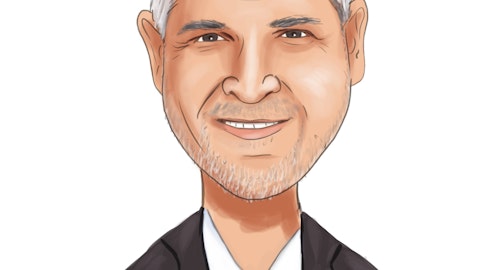Brent Thielman: Okay. That’s helpful, Scott. And on pressure pipe, when you look at the bidding pipeline, what’s sort of to come over the course of the next 12 months, Scott, is there an argument that the pressure pipe business can kind of hold in that 300 plus or minus revenue level for the next couple of years? There’s enough out there to support that kind of volume?
Scott Montross: Well, what I would tell you with that, Brent, is there’s a lot of that depends on the backlog you carry into the next year, right? And this big backlog really is the biggest one, I’ve ever seen here. But I think that is the key going into 2023. When you look at overall bidding in 2023, we’re expecting it to be a little bit lower than it was in 2022, but then again higher in 2024. So could you be 300 or near 300 area over that period of time? I think, especially with what steel prices are doing because, quite frankly, right now, steel prices are moving a little bit beyond what we thought they were going to in our forecast, I think that’s a pretty good possibility.
Brent Thielman: All right. Great. And then just the last one, I know you’ve got some pretty big CapEx plans and probably a little exhausted from tidying up the ERP system with the ParkUSA acquisition, but maybe you’re just your plan to the balance sheet over the next few quarters here?
Aaron Wilkins: Yes. We’re going to be focused on paying down the debt. We were, quite frankly, a little disappointed in our fourth quarter free cash. And I think we have a couple of things that just kind of slid out of the larger items that slipped out that hopefully will transact in the first quarter, and we’ll see that kind of come down. But that’s really our focus, Brent. We’re really trying to reload things and get the debt pay down as fast as possible. So that’s — in addition to just kind of, obviously, finishing things up on the reinforced concrete pipe machine and normal maintenance CapEx. So we don’t think that’s really our focus for 2023.
Brent Thielman: Okay. Thanks, guys. Appreciate it.
Scott Montross: Thanks, Brent.
Aaron Wilkins: Thanks, Brent.
Operator: And our next question comes from the line of David Wright with Henry Investment Trust. Please proceed with your question.
David Wright: Hey, good morning, guys.
Scott Montross: Good morning, David.
Aaron Wilkins: Good morning, David.
David Wright: A question, did you notice any tension on the standard municipal bid pipeline versus municipalities maybe putting those things on hold, trying to figure out what to do with all of their new infrastructure build money?
Scott Montross: No. Not — I mean, we would — that wouldn’t actually happen near term, David. When you — things like that with our backlog and what’s in front of us, those things are ready to go. Some of the delays that we may see maybe labor-related or getting equipment moved related permitting-related sometimes weather related. That’s why we see delays in those. The things that you’re talking about, I think, with the IIJA, the infrastructure package would be things that would be a couple of years out. Like the site’s reservoir, stuff that we talked about or the project that we talked about in the script, those are the things that, that would likely affect. But the near-term stuff generally wouldn’t have any impact on that.
There’s a little bit of IIJA money right now that’s in the market on an Eastern New Mexico job that I talked about in the script, but we’re expecting more as we go and that funding mechanism to start to impact probably some other projects that’s on the drawing board three, probably three years into the future. But no tension on that right now.





